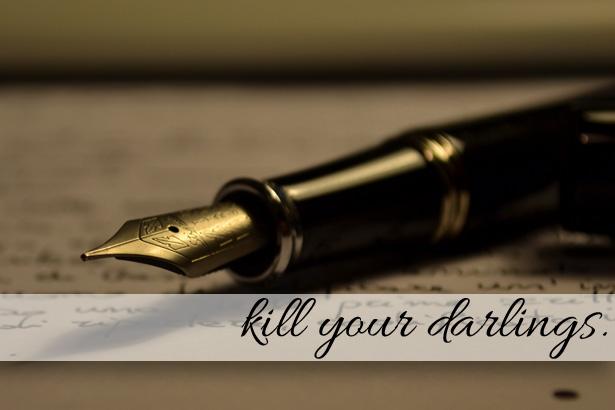
Stephen King once said, "Kill your darlings. Kill your darlings, even when it breaks your egocentric little scribbler's heart, kill your darlings."
And I have to say, sometimes I wish I could punch Stephen King for saying that...because he's right. And it's terribly annoying.
You see, I'm writing my first book. But if you've been reading for any bit of time, you probably already knew that.
At the moment, after receiving comments from some beta readers on the first few chapters, I'm sitting down and reevaluating. I'm rewriting and slashing and keeping and adjusting.
Some of the suggestions I've received from my beta readers I've received with open arms. I've read them and immediately said, "Man! That's a great idea! Why didn't I think of that before?"
Others, well, I haven't received so joyfully. I've read their words and a part of me is still objective. A part of me reads their suggestions and thinks, "That's a good idea, a good change. I should've seen that." And then there's another part of me that wants to act like a small child, kicking and screaming, "But I don't want to!"
///
Kill your darlings.
It's such a vicious phrase. Such an angry, violent phrase. And yet, for a writer sometimes it's necessary.
When I was at Q a few weeks ago, I had the opportunity to attend a workshop called How to Write a Book led by faith and culture writer Jonathan Merritt.
He gave those of us attending ten tips that he wished someone had told him before he became a writer. Number eight was a variation of King's words: don't fall in love with your work.
This might seem counterproductive to some people.
Wouldn't you want to love what you're writing? Wouldn't you want to love the words you're putting down on the page so that when you present it to people you can say, "Yes, I wrote that. Yes, it's good." Wouldn't you want to fall in love with what you're writing so you can be proud of what you've written?
The short answer is no.
See, the truth of the matter is, when you fall in love with your work and someone criticizes it or suggest changes, you have the same kind of reaction I did with the comments from some of my beta readers. You want to kick and scream and ignore what they have to say because it might not be your best work but you love it.
Falling in love with your work makes it personal when you need to be objective.
///
Perhaps the biggest change I've made thus far in my book is in regards to the prologue.
The original prologue was pretty long. Like 12,000 words long. It introduced the family, set up the story, made you (hopefully) fall in love with them and then it breaks your heart when the parents die and the little granddaughter is left alone (don't worry...that's not a spoiler, it'll be on the back of the book once it's published). And you know what almost all of my beta readers said?
Cut it. A lot.
And my heart broke a little bit. Because there were pretty words and nice phrases and emotionally stirring moments that I had come to love, not completely, but a little bit.
In the end, I cut it down. A lot. It went from the original 12,000 words to now being right around 1,200.
And you know what? It's so much better.
It's definitely not finished, but it's already way better than it was before. It fits the story arc better. It introduces the story better. It focuses the story better. It's just better.
There were some major parts in that prologue that were my darlings. I loved how I had written parts of it. I loved some of my turns of phrases and emotionally stirring moments.
If I'd stuck with my initial reaction, the end result of the book would probably have been decent, because I do genuinely feel like what I had written was decent. But decent isn't what I want.
Decent doesn't give you word-of-mouth, or sell thousands of books, or get you on those coveted bestselling lists, or change lives in the way I want to change lives with my stories.
And that's why you have to do what's hard as a writer. That's why you have to stay objective and kill your darlings, because as much as you might love some or your images, metaphors, or turns of phrase, they might not be the best way to tell the story. They might not impact your reader in the biggest way.
And in the end, what's more important? A pretty turn of phrase? Or countless people inspired and touched by what you've written?
I'm not super experienced at this, but I'd say the latter is better. At least that's what I want. So I'm trying to stay objective. I'm trying to remember that criticisms and comments aren't personal. I'm trying to remember that sometimes killing your darlings is a necessary evil to make your best book come to life.
What is the hardest part about editing for you? Do you find yourself holding on to phrases or metaphors that might be holding your story back? How do you get past your love (or even just like) for what you've written in order to kill those darlings that need killing?
 ----------
----------Photo Credit: Antonio Litterio. Used under Creative Commons Attribution-Share Alike 3.0 Unported license. Design by me.
Like what you're reading? Consider liking me on Facebook or following me on Twitter!
The post Kill Your Darlings appeared first on Shades of Shayes.
